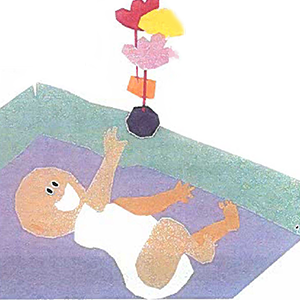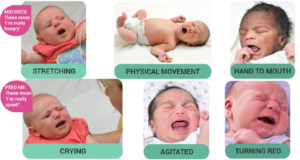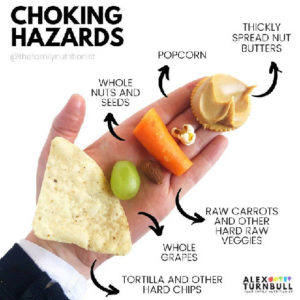Family
By this time, you may be thinking about going back to work soon. Make sure you have made plans for childcare. Prepare 1-2 weeks before going back to work, you may want to do trial runs of what your mornings will be like when you have to get ready with the baby before dropping her off at the nanny or daycare. This way the transition will be easier. Make sure that you make time for yourself, your partner, and your other children as well. You may also want to talk to your provider about family planning and get information on birth control options.
Development
Your baby should be smiling, laughing, and babbling. He should have good head control. He should begin to roll over and reach for objects. We encourage you to continue tummy time. Infant massage can also help calm and relax your baby when he is fussy. Continue to read to your baby.
Health
Setting up a daily routine for feedings, naps, and bedtime will help make longer sleeping stretches at night. Help your baby learn to put herself to sleep by putting her in her crib when she is drowsy, talking gently, and patting her to sleep. Providing regular structure and routines for your baby will help with her sense of security. The baby should not be sleeping in bed with you. Babies are very active at this age and can easily fall off of the bed.
If your baby is teething, he may be drooling a lot. Let him chew on cold teething rings. Wash your baby’s gums and teeth with a cloth and water twice a day, including once before bedtime. Never let your baby sleep with a bottle. Hold the bottle instead of propping it up and leaving it with the baby. Both of these things increase your baby’s risk of choking and tooth decay.
Nutrition
If your provider agrees, you can begin baby cereal with a spoon. Wait until six months to start other solid foods, beginning with mashed vegetables. Don’t give your baby any cow’s milk, honey, or egg whites until 12 months. If you are breastfeeding only and not using any formula, you will need to change from Vitamin D supplements to Poly-Vi-Sol with Iron.
Safety
Set your hot water heater at 120 °F. Never leave your child unattended in a place where he could fall. Never leave your baby alone in the car, even for a minute! The car seat should still be in the back seat, rear facing. Never place an infant in front of an airbag. Do not use a walker with wheels.
After Hours and Weekends
After 4:00 PM and before 8:00 AM
For medical advice when People’s is closed call After Hours Nurse line at 512-478-4939
Download PDF here.

















